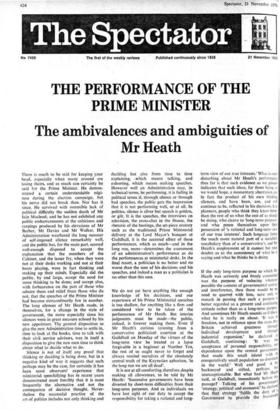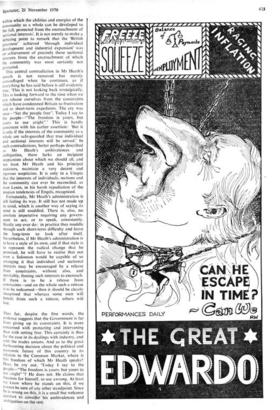THE PERFORMANCE OF THE PRIME MINISTER The ambivalences and ambiguities
of Mr Heath
There is much to be said for keeping your head, especially when many around are losing theirs, and as much can certainly be said for the Prime Minister. He demon- strated a certain understandable edgi- ness during the election campaign, but his nerve did not break then. Nor has it since. He survived with ostensible lack of political difficulty the sudden death of Mr bin Macleod; and he has not exhibited any public embarrassments at the criticisms and carpings produced by his elevations of Mr Barber, Mr Davies and Mr Walker. His Administration weathered the long summer of self-imposed silence remarkably well, and the public has, for the main part, seemed well-enough disposed to accept the explanation that the members of the Cabinet, and the lesser fry, when they were not at their desks working and not at their boats playing, were in fact thinking and making up their minds. Especially did the public, by and large, accept the need for some thinking to be done; and accept also, with forbearance on the part of those who admire them and relief from those who do not, that the speeches of the Prime Minister had become extraordinanly few in number. The long silences of Mr Heath made, in themselves, for a change in the style of government, the more especially since his silences were in great measure echoed by his new appointees. The general disposition to give the new Administration time to settle in, time to look at the books, time to talk with their civil service advisors, was in itself a disposition to give the new men time to think about what to decide what to do.
Silence is not of itself any proof that thinking or deciding is being done, but in a negative kind of way it suggests that such perhaps may be the case, for certainly it has been most observers' experience that ministerial speechifying has in recent years demonstrated most forcibly that it is most frequently the alternative and not the consequence of decisive thought. Never- theless the successful practice of the art of politics includes not only thinking and
deciding but also from time to time explaining, -which means talking, and exhorting, which means making speeches. However well an Administration may, in technical terms, be performing, it is failing in political terms if, through silence or through bad speeches, the public gets the impression that it is not performing well, or at all. In politics, silence is silver but speech is golden, or gilt. It is the speeches, the interviews on television, the cross-chat in the House, the rhetoric of the hustings, the set-piece oratory such as the traditional Prime Ministerial delivery at the Lord Mayor's banquet at Guildhall, it is the accreted effect of these performances, which as much—and in the long run, more—determines the assessment of an administration's performance as do the performances at ministerial desks. In the final resort, a politician is no better and no worse than the sum of his decisions and his speeches, and indeed a man as a politician is no other than this sum.
We do not yet have anything like enough knowledge of his decisions, and our experience of his Prime Ministerial speeches is too shallow, for anything like a firm and considered view to be taken of the performance of Mr Heath. But interim judgments must be made—the public, indeed, is forever making them. Even if Mr Heath's curious (coming from a conservative politician) assertion at the Guildhall on Monday of the virtues of the long-term view be treated as a lapse forgivable in a beginner at Number Ten, the rest of us ought never to forget and always remind ourselves of the absolutely central truth of the Keynesian aphorism, 'in the long run we are all dead'.
It is not at all comforting, therefore,despite making all allowances, to -be told by Mr Heath: 'Successive governments have been diverted by short-term difficulties from their long-term purposes. And as individuals we have lost sight of our duty to accept the responsibility for taking a rational and long- term view of our true interests.' What is most disturbing about Mr Heath's performance thus far is that such evidence as we possess indicates that such ideas, far from being, as we would hope, a momentary aberration, are in fact the product of his own thinking silences, and have been, are, and will continue to be, reflected in his decisions. It is planners, people who think they know better than the rest of us what the rest of us should be doing, who cleave to long-term purposes' and who preen themselves upon their possession of 'a rational and long-term view of our true interests'. Such language forms the much more natural part of a socialist's vocabulary than of a conservative's, and Mr Heath's employment of it cannot but raise doubts as and the consistency of what he is saying and what he thinks he is doing.
If the only long-term purpose to which Mr Heath was seriously and firmly committed was the purpose of reducing wherever possible the content of governmental activity and interference, then there would be DO need to quarrel with him, save only to remark in passing that such a purpose is better regarded as a present and continuing attitude rather than as a long-term parPose And sometimes Mr Heath sounds as if this is what he is really on about. 'It was in freedom, not in reliance upon the state, that Britain achieved greatness throne, individual development and through industrial expansion,' he declared at Guildhall, continuing: 'It was the acceptance of personal responsibility, not dependence upon the central government, that made this small island with its comparatively small population so dominant in the world.' Well and good. A bit hackneyed and stilted, perhaps, but unexceptionable. But what had Mr Head said, at Guildhall, immediately before this passage? Talking of his government's 'strategy, political and economic' he declared that that strategy 'fulfils the duty of Government to provide the framework within which the abilities and energies of the community as a whole can be developed to the full, protected from the encroachment of sectional interests'. It is not merely to make a debating point to remark that the 'British greatness' achieved 'through individual development and industrial expansion' was an achievement of precisely those sectional interests from the encroachment of which the community was most certainly not protected. This central contradiction in Mr Heath's speech is not removed but merely camouflaged when he continues, as if ekerything he has said before is self-evidently true, 'This is not looking back nostalgically. This is looking forward to the time when we can release ourselves from the constraints which have condemned Britain to frustration and to short-term expedients. The cry was once—"Set the people free". Today I say to the people—"The freedom is yours, but yours to use aright".' This is hardly consistent with his earlier assertion: Tut it is only if the interests of the community as a whole are safe-guarded that true individual and sectional interests will be served.' In such contradictions, better perhaps described as Mr Heath's ambivalences and ambiguities, there lurks an incipient utopianism about which we should all, and not least Mr Heath and his principal ministers, maintain a very decent and rigorous scepticism. It is only in a Utopia that the interests of individuals, sections and the community can ever be reconciled, as even Lenin, in his harsh repudiation of the utopian tendencies of Engels, recognised.
Fortunately, Mr Heath's administration is still feeling Its way. It still has not made up its mind, which is another way of saying its mind is still muddled. There is, also, no absolute imperative requiring any govern- ment to act, or to speak, consistently. Hardly any ever do: in practice they muddle through each short-term difficulty and leave the long-term to look after itself. Nevertheless, if Mr Heath's administration is to have a style of its own, and if that style is to represent the radical change that he promised, he will have to realise that not even a Solomon would be capable of so arranging it that individual and sectional interests may be encouraged by a release from constraints, without also, and inevitably, freeing such interests to encroach. If there is to be a release from constraints—and on the whole such a release is to be welcomed—then it should be clearly recognised that whereas some men will benefit from such a release, others will lose.
Thus far, despite the fine words, the evidence suggests that the Government is far from giving up its constraints. It is more concerned with protecting and intervening than with setting free. This certainly is thus far the case in its dealings with industry, and with the trades unions. And as to the great forthcoming decision about the political and economic future of this country in its relation to the Common Market, where is this freedom of which Mr Heath speaks? Does he cry out, 'Today I say to the People—"The freedom is yours, but yours to use aright" '? He does not. He claims that freedom for himself, to use awrong. At least We know where he stands on this, if we cannot be sure of any other standpoint. Since he is wrong on this, it is a small but welcome comfort to consider his ambivalences and ambiguities on the rest.















































 Previous page
Previous page